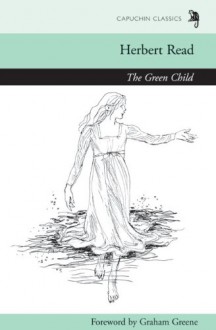The Green Child - Herbert Read

This book should have baffled me, I suppose. It's hard to say. The bizarre overall structure gives the lie to Read's clarity of expression; you could open it on any page, read a couple of paragraphs, and conclude that it was a rather dull novel by a similarly dull, well-meaning man. And yet, read it in full, and you're left with a distinctly trippy aftertaste, which draws into douebt the author's true intentions. You know you've been taken to a strange place inside your own head, but you don't recall the journey; the fabric of reality has been stretched, but it has happened without your knowing.
It's difficult to catch Read in the act of distorting space-time. An obvious example would be the transition between the human world and that of the Green Child, which takes place at the close of the first section and the opening of the last. This is made particularly disorientating by the splicing in of a lengthy middle chapter, detailing at great length Olivero's rise to power as President of the fictional Republic of Roncador. This section would be unremarkable to anyone even vaguely well-versed in the history of nineteenth century uprisings - or rather, remarkable in that, for a novel, it presents so little of any novelty. While the first and last sections play fast and loose with the laws of physics, President Olivero's story is ruthlessly procedural.
The first section is without doubt the strongest, and will leave the reader hoping for a pastoral fantasy, with perhaps a bit of the old cross-species romance; hopes that remain unfulfilled. In the final chapter, the narrative ultimately becomes one of philosophical reflection on the nature of life and acceptance of death. These themes do not, at first glance, run through the entire story, and the reader walks away unsatisfied in every sense.
The real question I was left with was this: should I be drawn into the bottomless pit that seems to have consumed those few who have tried seriously to pick The Green Child apart? The shadow of genius looms over this novel to such a degree that I can't help but feel suspicious. It's easy to be an apologist for something that sets itself up to be deliberately obscure, but I'm not even certain that that is what was intended. Perhaps The Green Child was really just the result of poor planning - the fusion of several ideas that should each have been the subject of stories in their own right. This was, after all, Read's only novel; perhaps the weirdness, the incongruities that make this book so unique, are symptoms of his own inexperience.
This book, among other recent reads, has made me realise that I dislike the 'story within a story' in the vast majority of cases. Once you've built up your reader's interest in one plotline, it's something of a slap in the face to expect them to engage instantly with another, one that they are well aware will be intermittent and ultimately inconsequential.
What are the book's implications for fantasy writing? Well, as far as influence goes, it's as dead as the Darling Downs Hopping Mouse. I still can't see how the story of the Green Children of Woolpit is "the norm to which all types of fantasy should conform", nor even what that myth has to do with his own novel. Still, I found that it rivalled Brian Aldiss's 'Hothouse' as a masterclass in portraying the alien uncomfortably close to ourselves.
Read The Green Child if you're looking for a short, insightful, and thoroughly unique human fable. Not suitable for epic fantasy, action, romance, realism, or history. This book seems determined to please just about nobody, and it was this, above all else, that made me warm to it.
Read full review at http://thebittern.blogspot.co.uk/2012/04/green-child.html

 Baffling, dreamlike, unsatisfying, crystalline, homely, intriguing and odd, reading The Green Child is a bit like having a long and rather annoying dream, in which nothing much is resolved but many interesting questions are raised in strange and new ways.
Baffling, dreamlike, unsatisfying, crystalline, homely, intriguing and odd, reading The Green Child is a bit like having a long and rather annoying dream, in which nothing much is resolved but many interesting questions are raised in strange and new ways. This book should have baffled me, I suppose. It's hard to say. The bizarre overall structure gives the lie to Read's clarity of expression; you could open it on any page, read a couple of paragraphs, and conclude that it was a rather dull novel by a similarly dull, well-meaning man. And yet, read it in full, and you're left with a distinctly trippy aftertaste, which draws into douebt the author's true intentions. You know you've been taken to a strange place inside your own head, but you don't recall the journey; the fabric of reality has been stretched, but it has happened without your knowing.
This book should have baffled me, I suppose. It's hard to say. The bizarre overall structure gives the lie to Read's clarity of expression; you could open it on any page, read a couple of paragraphs, and conclude that it was a rather dull novel by a similarly dull, well-meaning man. And yet, read it in full, and you're left with a distinctly trippy aftertaste, which draws into douebt the author's true intentions. You know you've been taken to a strange place inside your own head, but you don't recall the journey; the fabric of reality has been stretched, but it has happened without your knowing.